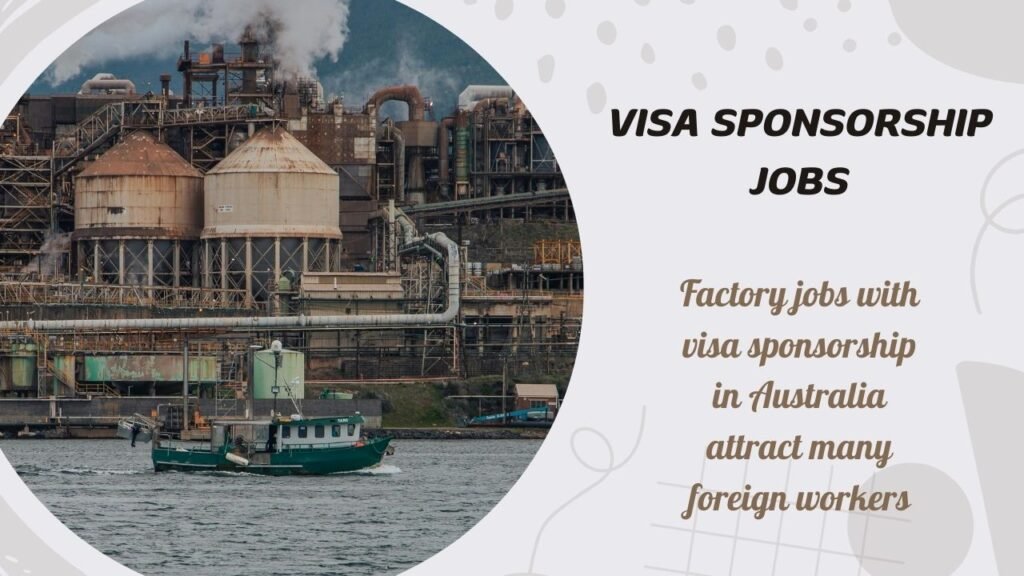Many people seek factory jobs in Australia. These positions often offer visa sponsorship, making them attractive for foreign workers.
Factory jobs can provide stable income and opportunities for growth. With Australia’s strong economy, many industries are hiring. Workers can find roles in manufacturing, production, and assembly. Salary levels vary based on experience and location. Knowing the pay range helps job seekers plan their finances.
This post explores factory jobs with visa sponsorship in Australia. We will discuss salary expectations, job types, and how to apply. Understanding these factors can help you make informed decisions about your career in Australia. Whether you are looking for your first job or a new opportunity, this information will guide you.
You May Also Like:

VISA Sponsorship Options
Factory jobs with visa sponsorship in Australia attract many foreign workers. These positions offer a chance to earn good salaries while living in a vibrant country. Understanding the available visa sponsorship options is crucial for those seeking employment. This knowledge helps in making informed decisions about working in Australia.
Types of VISAS
Australia offers several visa types for factory jobs with sponsorship. Each visa has specific requirements and benefits. Here are the most common types:
- Temporary Skill Shortage (TSS) Visa (482): This visa allows employers to sponsor skilled workers to fill labor shortages.
- Employer Nomination Scheme (ENS) Visa (186): This visa offers a pathway to permanent residency for skilled workers nominated by an employer.
- Regional Sponsored Migration Scheme (RSMS) Visa (187): This visa is for workers who want to live and work in regional Australia.
- Skilled Independent Visa (189): This visa is for skilled workers who are not sponsored by an employer but have skills in demand.
Here is a table summarizing these visa types:
| Visa Type | Duration | Pathway to Residency |
|---|---|---|
| TSS Visa (482) | Up to 4 years | Yes |
| ENS Visa (186) | Permanent | Yes |
| RSMS Visa (187) | Permanent | Yes |
| Skilled Independent Visa (189) | Permanent | Yes |
Understanding these visa types helps applicants choose the best option for their situation.
Eligibility Criteria
Eligibility for factory jobs with visa sponsorship varies by visa type. Each visa has specific requirements that applicants must meet. Here are some common criteria:
- Skills Assessment: Applicants must have their skills assessed by a relevant authority.
- Work Experience: Most visas require relevant work experience in the industry.
- English Language Proficiency: Applicants must demonstrate proficiency in English through tests like IELTS.
- Health and Character Requirements: Applicants must meet health checks and character requirements.
Here is a breakdown of the eligibility criteria for the TSS Visa (482):
| Criteria | Details |
|---|---|
| Age | Under 45 years |
| Qualifications | Relevant qualifications for the nominated occupation |
| Employment Offer | Must have a job offer from an approved employer |
Meeting these criteria is essential for obtaining a visa and starting a career in Australia.
Factory Job Roles
Factory jobs in Australia offer great opportunities for workers seeking visa sponsorship. Many roles are available across various industries. These jobs provide stable employment and competitive salaries. Understanding the different factory job roles helps in finding the right position.
Common Positions
Many factory job roles exist in Australia. Each role plays a crucial part in production and operations. Here are some common positions:
- Assembly Line Worker
- Machine Operator
- Forklift Operator
- Quality Control Inspector
- Warehouse Worker
- Packer
These positions require different skills and experience levels. Here is a brief overview of each role:
| Job Title | Responsibilities | Typical Salary (AUD) |
|---|---|---|
| Assembly Line Worker | Assemble products on the production line. | 45,000 – 55,000 |
| Machine Operator | Operate and maintain machinery. | 50,000 – 60,000 |
| Forklift Operator | Move materials using a forklift. | 50,000 – 58,000 |
| Quality Control Inspector | Inspect products for quality standards. | 48,000 – 57,000 |
| Warehouse Worker | Manage inventory and shipments. | 45,000 – 55,000 |
| Packer | Pack products for shipping. | 44,000 – 52,000 |
These roles are essential for factory operations. They help ensure smooth production processes. Many workers can find these jobs rewarding and stable.
Skills in Demand
Employers look for specific skills in factory job applicants. These skills help improve workplace efficiency. Here are some in-demand skills:
- Attention to Detail
- Teamwork
- Time Management
- Basic Math Skills
- Problem-Solving
Understanding these skills is essential for job seekers. Here is a closer look at each skill:
- Attention to Detail: Ensures accuracy in tasks and quality control.
- Teamwork: Works well with others in a fast-paced environment.
- Time Management: Meets deadlines and manages workload effectively.
- Basic Math Skills: Performs simple calculations for production tasks.
- Problem-Solving: Identifies issues and finds solutions quickly.
Having these skills can increase job opportunities. Employers value candidates who demonstrate these abilities.
Salary Expectations
Factory jobs in Australia offer many opportunities for skilled workers. Many of these positions come with visa sponsorship. This means foreign workers can gain employment while living in Australia. Salary expectations for these jobs can vary widely. Understanding the average pay and factors influencing salaries helps job seekers make informed decisions.
Average Salaries
The average salary for factory jobs with visa sponsorship in Australia is generally between AUD 50,000 to AUD 70,000 per year. Entry-level positions may start lower, while experienced workers can earn more. Here’s a breakdown of average salaries based on role:
| Job Title | Average Salary (AUD) |
|---|---|
| Production Worker | 50,000 |
| Machine Operator | 55,000 |
| Quality Control Inspector | 60,000 |
| Warehouse Supervisor | 70,000 |
Many factors can influence these salaries:
- Location of the job
- Experience level
- Specific industry
- Company size
Regions with high demand for factory workers often offer higher salaries. For example, major cities like Sydney and Melbourne pay more due to the cost of living. Entry-level roles typically pay less, while skilled positions can provide higher pay.
Factors Affecting Pay
Several factors can affect the salaries of factory jobs in Australia. Understanding these can help job seekers find better opportunities.
- Location: Jobs in urban areas often pay more than those in rural regions.
- Experience: More experience usually leads to higher pay.
- Industry: Some industries, like manufacturing and construction, tend to offer better salaries.
- Company Size: Larger companies may provide higher wages and benefits.
- Shift Type: Night shifts or overtime can increase earnings.
Negotiation skills also play a role. Candidates who negotiate well may secure better salaries. Researching average salaries for specific roles helps in this process. Understanding the local job market is essential. This knowledge empowers job seekers to make informed decisions about their employment.
Job Search Strategies
Factory jobs with visa sponsorship in Australia offer great opportunities. Many people seek these jobs for better salaries and working conditions. Job search strategies can help you find the right position. Knowing where to look and how to network is crucial. This guide will provide effective methods to help you secure a factory job in Australia.
Where to Find Jobs
Finding factory jobs with visa sponsorship requires using various resources. Here are some effective places to search:
- Job Boards: Websites like Seek, Indeed, and JobActive list many factory jobs.
- Company Websites: Visit the careers page of companies directly. Many firms post job openings there.
- Recruitment Agencies: Agencies can connect you with employers. They often know about sponsorship opportunities.
- Social Media: Use platforms like LinkedIn to find job listings and connect with hiring managers.
Consider the following table for the top job boards:
| Job Board | Website |
|---|---|
| Seek | www.seek.com.au |
| Indeed | www.indeed.com.au |
| JobActive | www.jobactive.gov.au |
Stay updated with alerts for new job postings. Set filters for visa sponsorship options. This will save time and help you focus on suitable jobs.
Networking Tips
Networking is vital in finding factory jobs in Australia. Building relationships can lead to job opportunities. Here are some effective networking tips:
- Attend Industry Events: Join trade shows and job fairs. Meet potential employers and learn about job openings.
- Join Online Groups: Participate in forums and social media groups related to factory jobs.
- Connect on LinkedIn: Send connection requests to industry professionals. Personalize your messages to stand out.
- Informational Interviews: Request short meetings with people in the industry. Learn about their experiences and seek advice.
Networking can also include:
- Sharing your resume with contacts.
- Following up with connections after meeting.
- Joining local community groups related to your field.
Building a strong network increases your chances of finding a job with visa sponsorship. Keep your communication clear and professional.
Work Culture in Factories
Factory jobs in Australia offer visa sponsorship and competitive salaries. The work culture in these factories is vital for employee satisfaction and productivity. Understanding the work environment and shift patterns can help job seekers prepare for their new roles.
Typical work Environment
The typical work environment in factories is busy and structured. Employees work together in teams to meet production goals. Safety is a top priority. Factories often have strict guidelines to ensure a safe workplace. Workers wear protective gear, such as helmets and gloves.
Factories can vary in size and type. Some are large with many employees, while others are smaller and more specialized. Common features of factory environments include:
- Open floor plans for easy communication
- Machinery and equipment for production
- Break rooms for relaxation during shifts
- Designated areas for safety training
Here is a table showing common factory types:
| Factory Type | Description |
|---|---|
| Manufacturing | Produces goods like electronics or furniture. |
| Food Processing | Prepares and packages food products. |
| Textile | Creates clothing and fabric products. |
Overall, factories create a collaborative atmosphere. Workers often build strong relationships. This support can lead to better job satisfaction.
Shift Patterns
Shift patterns in factories can differ widely. Factories operate to meet production demands. Shifts may be day, night, or rotating. Here are common shift types:
- Day Shift: Typically runs from 7 AM to 3 PM
- Evening Shift: Usually from 3 PM to 11 PM
- Night Shift: Often from 11 PM to 7 AM
Many factories use a rotating shift pattern. Workers change shifts every week or month. This system helps meet operational needs. Some workers prefer consistent shifts. Others enjoy the variety.
Breaks are important during shifts. Factories often schedule:
- Short breaks every 2-3 hours
- Lunch breaks lasting 30-60 minutes
Shift patterns can affect work-life balance. Flexible schedules help workers manage personal commitments. Factories may offer overtime opportunities too. This can increase earnings and provide extra hours.
You May Also Like:
VISA Sponsorship Hospitality Jobs Australia
Living in Australia
Living in Australia offers unique opportunities for those seeking factory jobs with visa sponsorship. The country is known for its vibrant culture, stunning landscapes, and strong economy. Understanding the cost of living and making cultural adjustments are key to settling in comfortably. This guide provides insights to help newcomers adapt and thrive in Australia.
Cost of Living
The cost of living in Australia can vary widely depending on the city. Major cities like Sydney and Melbourne are generally more expensive than smaller towns. Here is a breakdown of common expenses:
| Expense | Average Monthly Cost (AUD) |
|---|---|
| Rent (1-bedroom apartment) | 1,800 – 2,800 |
| Groceries | 300 – 600 |
| Utilities | 150 – 300 |
| Transportation | 100 – 200 |
Here are some key points to remember about the cost of living:
- Rent can take a large part of your salary.
- Groceries are relatively affordable but vary by location.
- Public transport is a cost-effective option.
Planning your budget is crucial. Look for jobs that offer good salaries to cover living costs. This will help you live comfortably while enjoying everything Australia has to offer.
Cultural Adjustments
Adjusting to a new culture can be challenging but rewarding. Australians are known for their friendly and relaxed nature. Here are some cultural aspects to consider:
- People often greet each other with a friendly “G’day.”
- Sports play a big role in Australian life.
- Barbecues are popular social events.
Here are some tips for cultural adjustments:
- Learn basic Australian slang to communicate better.
- Join local groups or clubs to meet new people.
- Participate in community events to feel more connected.
Understanding local customs and values helps ease the transition. Embrace the laid-back lifestyle. Be open to learning and exploring new experiences. This will make living in Australia enjoyable and fulfilling.
Long-term Career Prospects
Factory jobs with visa sponsorship in Australia offer not just immediate income but also long-term career prospects. Many workers find a stable job in a growing industry. These jobs can lead to better roles and increased salaries over time. Understanding the long-term potential of these positions is essential for anyone considering a career in this field.
Advancement Opportunities
Factory jobs provide various advancement opportunities. Starting in an entry-level position can lead to higher roles as you gain experience. Here are some common paths for advancement:
- Team Leader: Oversee a small group of workers.
- Supervisor: Manage operations and ensure productivity.
- Quality Control Manager: Ensure products meet quality standards.
- Operations Manager: Oversee entire factory operations.
Many factories offer training programs. These programs help employees learn new skills. Employees can also attend workshops or courses. This can lead to promotions and higher pay.
Here’s a simple table showing potential salary increases with advancement:
| Position | Average Salary (AUD) |
|---|---|
| Entry-Level Worker | 50,000 |
| Team Leader | 60,000 |
| Supervisor | 75,000 |
| Quality Control Manager | 85,000 |
| Operations Manager | 100,000+ |
These roles not only increase your salary but also add more responsibility. A commitment to learning and growth is vital. Employees who show dedication are often the first to be promoted.
Industry Growth Trends
The manufacturing industry in Australia is growing. This growth leads to more factory jobs, especially for those with visa sponsorship. The demand for skilled workers increases as technology improves. Factories need workers who can operate new machinery and tools.
Key trends in the industry include:
- Automation: Many factories are using robots. This creates jobs in programming and maintenance.
- Sustainability: More factories focus on green practices. This opens roles in environmental management.
- Technological Advancements: Factories need skilled workers to manage new technologies.
According to recent reports, the manufacturing sector is expected to grow by 2-3% annually. This growth can lead to:
- More job openings.
- Better wages for skilled workers.
- Increased investment in training programs.
These trends are promising for factory workers. With the right skills and experience, workers can expect a bright future in this field.
Conclusion
Finding factory jobs with visa sponsorship in Australia can be rewarding. Many positions offer competitive salaries and benefits. These jobs provide a chance for better living standards. Skilled workers are in demand across various industries. Researching job opportunities is key.
Connect with employers and agencies that offer sponsorship. This path can lead to a stable career and a new life in Australia. Stay informed about visa requirements and job openings. Your journey to a fulfilling job can start today.
 AWE Credits Free VISA Consultancy Service in USA, UK, UAE, CANADA, Australia
AWE Credits Free VISA Consultancy Service in USA, UK, UAE, CANADA, Australia





